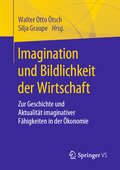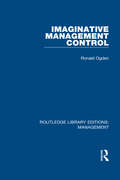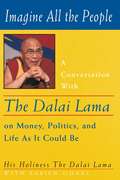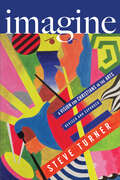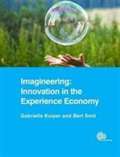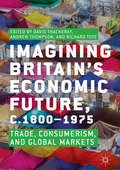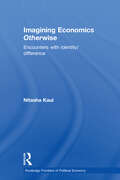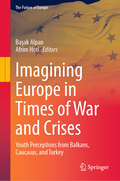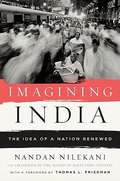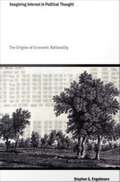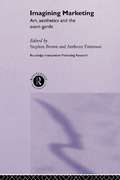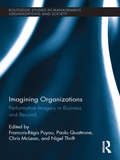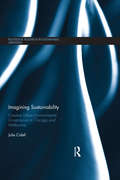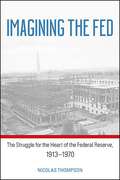- Table View
- List View
Images of Organization: 30th Anniversary Edition
by Professor Gareth MorganSince its first publication over twenty years ago, Images of Organization has become a classic in the canon of management literature. The book is based on a very simple premise—that all theories of organization and management are based on implicit images or metaphors that stretch our imagination in a way that can create powerful insights, but at the risk of distortion. Gareth Morgan provides a rich and comprehensive resource for exploring the complexity of modern organizations internationally, translating leading-edge theory into leading-edge practice.
Images of Projects
by Mark Winter Tony SzczepanekIn this very distinctive book, Images of Projects challenges how we think about projects in the most fundamental way: it rejects outright the idea of a one 'best way' to view all projects and also the idea of following a prescriptive approach. In contrast, Images of Projects seeks to encourage a more pragmatic and reflective approach, based on deliberately seeing projects from multiple perspectives, exploring the insights and implications which flow from these, and crafting appropriate action strategies in complex situations. Based on real examples and the authors' work over the last ten years, Images of Projects presents seven pragmatic images for making sense of the complex realities of projects. Illustrated using various models, these images are presented in ways that allow the reader to reflect upon their own mental models in relation to the different perspectives in this book.
Imagination und Bildlichkeit der Wirtschaft: Zur Geschichte und Aktualität imaginativer Fähigkeiten in der Ökonomie
by Walter Otto Ötsch Silja GraupeDer vorliegende Band stellt ein erstes Grundlagenwerk zur Imaginationsforschung in der Ökonomie dar. Er erforscht die ökonomische Theoriegeschichte (auch mit Bezug auf die Philosophiegeschichte) und fragt, welche Bilder und Selbstbilder über Menschen, über das wirtschaftliche System und über die Zukunft in ökonomischen Theorien enthalten sind. Wie ist die Beschäftigung mit Imaginationen im Mainstream der Wirtschaftswissenschaften verloren gegangen und wie kann sie wiederbelebt werden?Prof. Dr. Walter Otto Ötsch ist Professor für Ökonomie und Kulturgeschichte an der Cusanus Hochschule für Gesellschaftsgestaltung.Prof. Dr. Silja Graupe ist Professorin für Ökonomie und Philosophie und Leiterin des Instituts für Ökonomie der Cusanus Hochschule für Gesellschaftsgestaltung.
Imaginative Leadership: How Leaders of Marginalized Groups Negotiate Intergroup Relations
by Jolanda Jetten Frank MolsWhat separates leaders like Nelson Mandela and Mahatma Gandhi from the leaders found in convention guidebooks on leadership is that they were able to lead despite persecution, imprisonment, and other obstacles. Their reality stands in contrast to the implicit assumption often found in leadership research: that leaders can choose from a wide range of strategies. Existing leadership models are inadequate for understanding leadership of groups that are marginalized--leaders of marginalized groups are seldom in a position to choose what course of action to take to achieve group objectives. In this chapter, the authors look at what makes leaders like Mandela and Gandhi so effective, and discuss leadership strategies that leaders of marginalized groups can pursue. They argue that the extent to which devalued groups and their leaders share identity determines the extent to which leaders can change, influence, and steer the group, and manage intergroup relations. This chapter was previously published as chapter 5 of "Crossing the Divide: Intergroup Leadership in a World of Difference."
Imaginative Management Control (Routledge Library Editions: Management #47)
by Ronald OgdenOriginally published in 1970. Drawing on his knowledge of business methods in Europe, America and Asia, Ronald Ogden examines the necessity for control in a business and the ways in which it should be exercised in order to obtain the most effective and profitable results. He shows that control can be exercised through carefully planned objectives which must, in their turn, be broken down into clearly defined targets. Realistic planning is discussed, and the author considers the effective implementation of plans by means of various techniques such as budgeting, costing, staff control, operational research, and network planning. The study will be of interest not only to managers but also to students of management concerned with modern business techniques and with the functions and responsibilities of management and control.
Imagine All the People: A Conversation with the Dalai Lama on Money, Politics, and Life As It Could Be
by His Holiness the Dalai Lama Anne Benson Fabien OuakiIf you could sit down with the Dalai Lama and talk with him about anything, what would you discuss? Fabien Ouaki, a prominent French businessman, was granted such an opportunity and asked the Dalai Lama for his thoughts on the everyday issues that fill our newspapers and our lives. This is the record of these varied and remarkable conversations. Covered are a wide spectrum of topics - political, social, personal and spiritual - including the media and education, marriage and sex, and disarmament and compassion. Blessed by His Holiness' buoyant and insightful thoughts, Imagine All the People allows readers to glimpse the spontaneous workings of an extraordinary mind at once of - and above - this world. Includes the full text of The Global Community and the Need for Universal Responsibility.If you could sit down with the Dalai Lama and talk with him about anything, what would you discuss? Fabien Ouaki, a prominent French businessman, was granted such an opportunity and asked the Dalai Lama for his thoughts on the everyday issues that fill our newspapers and our lives. This is the record of these varied and remarkable conversations. Covered are a wide spectrum of topics - political, social, personal and spiritual - including the media and education, marriage and sex, and disarmament and compassion. Blessed by His Holiness' buoyant and insightful thoughts, Imagine All the People allows readers to glimpse the spontaneous workings of an extraordinary mind at once of - and above - this world. Includes the full text of The Global Community and the Need for Universal Responsibility.
Imagine Belonging: Your Inclusive Leadership Guide To Building And Equitable Workplace
by Mpa Rhodes PerryImagine It Forward: Courage, Creativity, and the Power of Change
by Tahl Raz Beth ComstockFROM ONE OF TODAY'S FOREMOST INNOVATION LEADERS, AN INSPIRING, PERSONAL APPROACH TO MASTERING CHANGE IN THE FACE OF UNCERTAINTY. Confronting change is incredibly hard, both organizationally and personally. People become resistant. They are afraid. Yet the pace of change in our world will never be slower than it is right now, says Beth Comstock, the former Vice Chair and head of marketing and innovation at GE. Imagine It Forward is an inspiring, fresh, candid, and deeply personal book about how to grapple with the challenges to change we face every day. It is a different kind of narrative, a big picture book that combines Comstock’s personal story in leading change with vital lessons on overcoming the inevitable roadblocks. One of the most successful women in business, Comstock shares her own transformation story from introverted publicist to GE’s first woman Vice Chair, and her hard-won lessons in shifting GE, a 125 year old American institution, toward a new digital future and a more innovative culture. As the woman who initiated GE's Ecomagination clean-energy and its (and NBC’s) digital transformations, Comstock challenged a global organization to not wait for perfection, but to seek out emerging trends, embrace smart risks and test ideas boldly, and often. She shows how each one of us can become a “change maker” by leading with imagination. “Ideas are rarely the problem,” writes Comstock. “What holds all of us back, really—is fear. It’s the attachment to the old, to ‘What We Know.’” As Comstock makes clear, transforming the mindset and culture of a company is messy. There is no easy checklist. It is fraught with uncertainty, tension and too often failure. It calls for the courage to defy convention, go around corporate gatekeepers when necessary, and reinvent what is possible. For all those looking to spearhead change in their companies and careers, and reinvent “the way things are done,” Imagine It Forward masterfully points the way.
Imagine It Forward: Courage, Creativity, and the Power of Change
by Tahl Raz Beth ComstockFrom one of today’s foremost innovation leaders, an inspiring and practical guide to mastering change in the face of uncertainty.The world will never be slower than it is right now, says Beth Comstock, the former Vice Chair and head of marketing and innovation at GE. But confronting relentless change is hard. Companies get disrupted as challengers steal away customers; employees have to move ahead without knowing the answers. To thrive in today’s world, every one of us has to make change part of our job. In Imagine It Forward, Comstock, in a candid and deeply personal narrative, shares lessons from a thirty year career as the change-maker in chief, navigating the space between the established and the unproven. As the woman who initiated GE's digital and clean-energy transformations, and its FastWorks methodology, she challenged a global organization to not wait for perfection but to spot trends, take smart risks and test new ideas more often. She shows how each one of us can—in fact, must—become a “change maker.” “Ideas are rarely the problem,” writes Comstock. “What holds all of us back, really—is fear. It’s the attachment to the old, to ‘What We Know.’” Change is messy and fraught with tension, uncertainty and failure. Being “change ready” calls for the courage to defy convention, the resilience to overcome doubts, and the savvy to know when to go around corporate gatekeepers to reinvent what is possible. Among the practical takeaways Comstock offers: • The power of discovery—bringing the outside into your organization. It’s about turning the world into a classroom. • Find a spark—provocateurs who challenge established ways of thinking can be a powerful catalyst for change. • Give yourself permission—every change maker must learn to give herself permission to push outside expectations and boundaries. Confronting today’s accelerating change requires an extraordinary degree of problem-solving, collaboration, and forward-thinking leadership to unlock every person’s potential. Imagine It Forward masterfully points the way.
Imagine: A Vision for Christians in the Arts
by Steve TurnerImagine art that is risky, complex, and subtle. Imagine music, movies, books, and paintings of the highest quality. Imagine art that permeates society, challenging conventional thinking and standard morals to their core. Imagine that it is all created by Christians! This is the bold vision of Steve Turner, who has worked among a wide variety of artists for decades. He believes Christians should confront society and the church using art's powerful impact. Art can faithfully chronicle the lives of ordinary people and express the transcendence of God. And Christians should be involved in every level of the art world and in every medium. In this revised and expanded edition of a contemporary classic, Turner builds a compelling case for Christians in the arts. If Jesus is Lord of all of life and creation, then art is part of his cultural mandate. It can and should be a way of expressing faith through creatively, beautifully, and truthfully arranged words, sounds, and sights. Now includes study questions for individual reflection or group discussion.
Imagined Futures: Fictional Expectations and Capitalist Dynamics
by Jens BeckertConsumers, investors, and corporations orient their activities toward a future that contains opportunities and risks. How do these actors assess uncertainty? Jens Beckert adds a new chapter to the theory of capitalism by showing how fictional expectations drive modern economies--or throw them into crisis when imagined futures fail to materialize.
Imagineering: Innovation in the Experience Economy
by Gabrielle Kuiper Bert SmitTo survive in today's complex economies, it is imperative for companies to understand their consumers in terms of how and why they like to use their products. Distinction based on quality no longer provides competitive advantage. Imagineers use design methods to create meaningful experiences that connect consumers to brands, employees to companies and consumers to consumers. This book explains the background of the need for experiences and then focusses on how to design them. Bringing theory into practice for students of tourism marketing, event planning and business, it provides a window into the creative world of Imagineering.
Imaging in Advertising: Verbal and Visual Codes of Commerce
by Fern L. JohnsonThe dominance of advertising in everyday life carries potent cultural meaning. As a major force in the rise of "image based culture," advertising spreads images that shape how people live their lives. While scholarship on visual images has advanced our understanding of the role of advertising in society, for example in revealing how images of extremely thin female models and athletic heroes shape ideals and aspirations, images circulated through lagnuage codes--or "verbal images"--in advertising have received less attention. Imaging in Advertising explores how the verbal and visual work together to build a discourse of advertising that speaks to audiences and has the power to move them to particular thoughts and actions. In this book, Fern L. Johnson presents a series of case studies exploring important advertising images--racial connotations in cigarette advertising, representations of cultural diversity in teen television commercials, metaphors of the face appearing in ads for skin care products, language borrowed from technology to sell non-technology products, and the illusion of personal choice that is promoted in many Internet web sites. Johnson argues that examining the interplay of verbal and visual images as a structured whole exposes the invase role of advertising in shaping culture in 21st century America.
Imagining Britain’s Economic Future, c.1800–1975: Trade, Consumerism And Global Markets
by Andrew Thompson Richard Toye David ThackerayFollowing the Brexit vote, this book offers a timely historical assessment of the different ways that Britain’s economic future has been imagined and how British ideas have influenced global debates about market relationships over the past two centuries. The 2016 EU referendum hinged to a substantial degree on how competing visions of the UK should engage with foreign markets, which in turn were shaped by competing understandings of Britain’s economic past. The book considers the following inter-related questions: - What roles does economic imagination play in shaping people’s behaviour and how far can insights from behavioural economics be applied to historical issues of market selection? - How useful is the concept of the ‘official mind’ for explaining the development of market relationships? - What has been the relationship between expanding communications and the development of markets? - How and why have certain regions or groupings (e.g. the Commonwealth) been ‘unimagined’- losing their status as promising markets for the future?
Imagining Consumers: Design and Innovation from Wedgwood to Corning (Studies in Industry and Society #16)
by Regina Lee BlaszczykWinner of the Hagley Prize in Business History from The Hagley Museum and Library and the Business History ConferenceSelected by Choice Magazine as an Outstanding Academic TitleOriginally published in 1999. Imagining Consumers tells for the first time the story of American consumer society from the perspective of mass-market manufacturers and retailers. It relates the trials and tribulations of china and glassware producers in their contest for the hearts of the working- and middle-class women who made up more than eighty percent of those buying mass-manufactured goods by the 1920s. Based on extensive research in untapped corporate archives, Imagining Consumers supplies a fresh appraisal of the history of American business, culture, and consumerism. Case studies illuminate decision making in key firms—including the Homer Laughlin China Company, the Kohler Company, and Corning Glass Works—and consider the design and development of ubiquitous lines such as Fiesta tableware and Pyrex Ovenware.
Imagining Economics Otherwise: Encounters with Identity/Difference (Routledge Frontiers Of Political Economy Ser.)
by Nitasha KaulIt is possible to beirrational without beinguneconomic ? What is the link betweenValue andvalues ? What do economists do when theyexplain ? We live in times when the economic logic has become unquestionable and all-powerful so that our quotidian economic experiences are defined by their scientific construal. This book is the result of a
Imagining Europe in Times of War and Crises: Youth Perceptions from Balkans, Caucasus, and Turkey (The Future of Europe)
by Başak Alpan Afrim HotiThis book aims to explore the perceptions of the EU integration by the young population in its “periphery”. It thereby bridges the gap between perceptions studies, youth studies, and the center-periphery conceptual framework. The chapters in the volume make use of data generated from focus group meetings with university students aged between 18-30 (which is the age range generally used by the European Social Survey to group young citizens) in Romania, Kosovo, Albania, North Macedonia, Georgia and Turkiye.
Imagining India
by Nandan NilekaniIndian software entrepreneur Nandan Nilekani has written the definitive book about modern India. Nilekani gives us a fascinating new perspective for the twenty-first century, defying received and imported wisdom, and showing us what is really at stake in the world's largest democracy. He reveals why India's huge population has now become her greatest strength; how information technology is bringing the benefits of globalization; why rapid urbanization is transforming social and political life; and how we can learn from India's difficult journey towards a single internal market. He also gets to the heart of debates about labour reform, the social security system, higher education and the role of the state. And he asks the key questions of the future: how will India as a global power avoid the mistakes of earlier development models? Will further access to the open market continue to stimulate such extraordinary growth? And how will all this affect - and be shaped by - her young people?
Imagining India: इमॅजिनिंग इंडिया
by Nandan Nilekani Aparna Velankarसमकालीन संदर्भात अत्यंत महत्त्वाच्या अशा या पुस्तकात भारताचा प्रदीर्घ इतिहास, गुंतागुंतीचे वर्तमान आणि अनेक शक्यतांना जन्माला घालणारे भविष्य यांचा एक सुसंगत असा अन्वय लावण्याचा प्रयत्न नंदन निलेकणी यांनी केला आहे. स्वातंत्र्योत्तर काळातल्या समाजवादी धोरणांमागचे तत्कालीन उद्देश कितीही चांगले असले, तरी प्रत्यक्ष व्यवहारात मात्र या धोरणांची परिणती लोकशाही खिळखिळी करणाऱ्या कुचंबल्या वर्तमानात कशी आणि का झाली, याचे सखोल विवेचन निलेकणी यांनी केले आहे. वर्तमान आणि भविष्य यांचा खंबीर आधार म्हणून उदयाला आलेली भारतातील तरुण लोकसंख्येची दमदार शक्ती हा कळीचा मुद्दा का आहे; याचे विश्लेषण हा या पुस्तकाचा महत्त्वाचा भाग. माहिती तंत्रज्ञानाच्या क्षेत्रात झपाट्याने होत जाणाऱ्या क्रांतीमुळे केवळ व्यापार, उद्योग आणि सरकारी कारभारातच नव्हे; तर बहुसंख्य भारतीयांच्या आयुष्यात किती रोमांचक परिवर्तन घडते आहे; याचे अत्यंत रोचक वर्णन या पुस्तकात आहे. जातीच्या गणितांवर बेतलेले राजकारण, कामगार क्षेत्रात दीर्घकाळ प्रलंबित राहिलेल्या सुधारणा, पायाभूत सुविधांची उभारणी, उच्च शिक्षणाचे क्षेत्र आणि भारतातला इंग्रजी भाषेचा वाढता प्रभाव यांसारख्या कळीच्या वादग्रस्त मुद्द्यांचे नंदन निलेकणी यांनी विस्ताराने आणि संपूर्णत: नव्या दृष्टिकोनांसह विस्तृत विवेचन केले आहे. जिथे काही बलाढ्य कंपन्यांच्या वार्षिक उलाढालीचे आकडे हे छोट्या देशांच्या संपूर्ण अर्थव्यवस्थेपेक्षाही मोठे होत चालले आहेत, अशा जागतिकीकरणाच्या प्रक्रियेत शासन संस्थांची नेमकी भूमिका काय; याचाही ऊहापोह निलेकणी यांनी केला आहे. सार्वजनिक आयुष्यातल्या प्रत्येक क्षेत्रात नवविचारांची-नवनिर्मितीची आणि सुधारणांची गरज अधोरेखित करणारे हे पुस्तक भविष्य तोलून धरू शकतील, अशा नव्या संकल्पना समोर ठेवते. खऱ्या अर्थाने सर्वसमावेशक असणाऱ्या लोकशाही व्यवस्थेपासून सामाजिक सुरक्षेच्या छत्रापर्यंत आणि सार्वजनिक आरोग्याच्या सक्षम क्षेत्रापासून शाश्वत ऊर्जा-धोरणापर्यंतच्या या नव्या संकल्पना वर्तमान राजकारणाला ओलांडून पुढे येतील आणि त्यातूनच देशाचे भविष्य आकाराला येईल, असा युक्तिवाद नंदन निलेकणी यांनी या पुस्तकात मांडला आहे.
Imagining Interest in Political Thought: Origins of Economic Rationality
by Stephen G. EngelmannImagining Interest in Political Thought argues that monistic interest--or the shaping and coordination of different pursuits through imagined economies of self and public interest--constitutes the end and means of contemporary liberal government. The paradigmatic theorist of monistic interest is the English political philosopher Jeremy Bentham (1748-1832), whose concept of utilitarianism calls for maximization of pleasure by both individuals and the state. Stephen G. Engelmann contends that commentators have too quickly dismissed Bentham's philosophy as a crude materialism with antiliberal tendencies. He places Benthamite utilitarianism at the center of his account and, in so doing, reclaims Bentham for liberal political theory. Tracing the development of monistic interest from its origins in Reformation political theory and theology through late-twentieth-century neoliberalism, Engelmann reconceptualizes the history of liberalism as consisting of phases in the history of monistic interest or economic government. He describes how monistic interest, as formulated by Bentham, is made up of the individual's imagined expectations, which are constructed by the very regime that maximizes them. He asserts that this construction of interests is not the work of a self-serving manipulative state. Rather, the state, which is itself subject to strict economic regulation, is only one cluster of myriad "public" and "private" agencies that produce and coordinate expectations. In place of a liberal vision in which government appears only as a protector of the free pursuit of interest, Engelmann posits that the free pursuit of interest is itself a mode of government, one that deploys individual imagination and choice as its agents.
Imagining Marketing: Art, Aesthetics and the Avant-Garde (Routledge Interpretive Marketing Research Ser.)
by Stephen Brown Anthony PattersonImagination is a word that is widely used by marketing practitioners but rarely examined by marketing academics. This neglect is largely due to the imagination's 'artistic' connotations, which run counter to the 'scientific' mindset that dominates marketing scholarship. Of late, however, an artistic 'turn' has taken place in marketing research, and
Imagining Organizations: Performative Imagery in Business and Beyond (Routledge Studies in Management, Organizations and Society)
by Nigel Thrift Paolo Quattrone Francois-Régis Puyou Chris McLeanOrganizations rely extensively upon a myriad of images and pictorial representations such as budgets, schedules, reports, graphs, and organizational charts to name but a few. Visual images play an integral role in the process of organizing. This volume argues that images in organizations are ‘performative’, meaning that they can be seen as performances, rather than mere representations, that play a significant role in all kind of organizational activities. Imagining Organizations opens up new ways of imagining business through an interdisciplinary approach that captures the role of visualizations and their performances. Contributions to this volume challenge this orthodox view to explore how images in business, organizing and organizations are viewed in a static and rigid form. Imagining Business addresses the question of how we visualize organizations and their activities as an important aspect of managerial work, focusing on practices and performances, organizing and ordering, and media and technologies. Moreover, it aims to provide a focal point for the growing collection of studies that explore how various business artifacts draw on the power of the visual to enable various forms of organizing and organizations in diverse contexts.
Imagining Sustainability: Creative urban environmental governance in Chicago and Melbourne (Routledge Research in Sustainable Urbanism)
by Julie CidellCities, rather than nations, have become the key sites for enacting environmental policies. This is due to the combination of growing urban populations and increased action on the part of local governments (generally attributed to national governments’ failure to act on climate change). Imagining Sustainability seeks to understand how actors in local government conceptualize sustainability and their role in producing it, and what difference that understanding makes to their physical, political, and social environments now and in the future. International comparisons can uncover new ideas and possibilities. Chicago and Melbourne are prime candidates for such a comparison: they are cities of the same age, they have similar historical trajectories as interior gateways followed by industrial growth and then deindustrialization, and they have demonstrated the same recent desire to be global champions of sustainability. Based on qualitative fieldwork in these two cities, this book uses Karen Barad’s methodology of diffraction to read these case studies through each other. This methodology helps to understand not only what differences exist between these two places, but what effects those differences have on the urban environment. This book will be of great interest to students and scholars of urban studies, urban planning and environmental policy and governance.
Imagining the Cosmopolitan in Public and Professional Writing
by Anne SurmaIn this important book, Surma combines threads from ethical, political, communications, sociological, feminist and discourse theories to explore the impact of writing in a range of contexts and illustrate the ways in which it can strengthen social connections.
Imagining the Fed: The Struggle for the Heart of the Federal Reserve, 1913-1970
by Nicolas ThompsonImagining the Fed traces a six-decade struggle to shape the Federal Reserve's policymaking organs, the Washington-based Board and the Federal Open Market Committee. Conventional wisdom holds that Congress ended the system's struggle in 1935 by granting the Board a voting majority on the open market committee, establishing its Fed primacy. Yet, this book shows that the Fed's struggle continued flaring to yield consequential changes until 1970, when the modern Fed emerged.Nicolas Thompson explores how the Fed's evolution from a weak and fragmented sprawl into the world's most powerful central bank paralleled broader changes in the American polity. The rise and fall of hegemonic political parties remade the Board and elevated its Fed position, while the wars of the twentieth century concentrated Fed power in New York. When peace returned, however, system agents inherited a central bank that veered from the law, inviting renewed struggle. This process continued into the 1960s, when an ascendant Democratic Party loaded the Board with economists, who remade it in their image. Later partisan choices to launch unfunded wars at home and abroad unleashed inflationary forces which severed the dollar's link to gold. Freed from its golden fetters, monetary policy emerged as a domestic policy realm and Fed power durably concentrated in a new Board technocracy.


